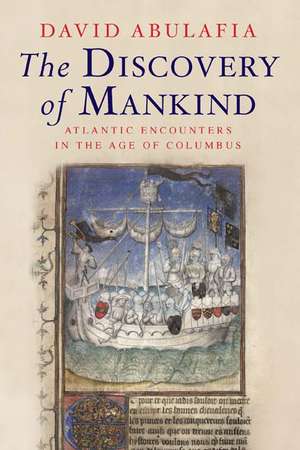The Discovery of Mankind: Atlantic Encounters in the Age of Columbus
Autor David Abulafiaen Limba Engleză Paperback – 29 sep 2009
A new and fascinating perspective on the earliest phases of European exploration across the Atlantic Ocean
The first landings in the Atlantic World generated striking and terrifying impressions of unknown peoples who were entirely foreign to anything in European explorers’ experience. From the first recorded encounters with the native inhabitants of the Canary Islands in 1341 to Columbus's explorations in 1492 and Cabral's discovery of Brazil in 1500, western Europeans struggled to make sense of the existence of the peoples they met. Were they Adam's children, of a common lineage with the peoples of the Old World, or were they a separate creation, the monstrous races of medieval legend? Should they govern themselves? Did they have the right to be free? Did they know God? Could they know God?
Emphasizing contact between peoples rather than the discovery of lands, and using archaeological findings as well as eyewitness accounts, David Abulafia explores the social lives of the New World inhabitants, the motivations and tensions of the first transactions with Europeans, and the swift transmutation of wonder to vicious exploitation. Lucid, readable, and scrupulously researched, this is a work of humane engagement with a period in which a tragically violent standard was set for European conquest across the world.
The first landings in the Atlantic World generated striking and terrifying impressions of unknown peoples who were entirely foreign to anything in European explorers’ experience. From the first recorded encounters with the native inhabitants of the Canary Islands in 1341 to Columbus's explorations in 1492 and Cabral's discovery of Brazil in 1500, western Europeans struggled to make sense of the existence of the peoples they met. Were they Adam's children, of a common lineage with the peoples of the Old World, or were they a separate creation, the monstrous races of medieval legend? Should they govern themselves? Did they have the right to be free? Did they know God? Could they know God?
Emphasizing contact between peoples rather than the discovery of lands, and using archaeological findings as well as eyewitness accounts, David Abulafia explores the social lives of the New World inhabitants, the motivations and tensions of the first transactions with Europeans, and the swift transmutation of wonder to vicious exploitation. Lucid, readable, and scrupulously researched, this is a work of humane engagement with a period in which a tragically violent standard was set for European conquest across the world.
Preț: 156.89 lei
Nou
Puncte Express: 235
Preț estimativ în valută:
30.03€ • 32.63$ • 25.24£
30.03€ • 32.63$ • 25.24£
Carte disponibilă
Livrare economică 31 martie-14 aprilie
Livrare express 14-20 martie pentru 32.67 lei
Preluare comenzi: 021 569.72.76
Specificații
ISBN-13: 9780300158212
ISBN-10: 0300158211
Pagini: 408
Ilustrații: 30 b-w illus.
Dimensiuni: 144 x 227 x 23 mm
Greutate: 0.59 kg
Editura: Yale University Press
Colecția Yale University Press
ISBN-10: 0300158211
Pagini: 408
Ilustrații: 30 b-w illus.
Dimensiuni: 144 x 227 x 23 mm
Greutate: 0.59 kg
Editura: Yale University Press
Colecția Yale University Press
Notă biografică
David Abulafia is professor of Mediterranean History at Gonville and Caius College, University of Cambridge. He is the author or editor of numerous books, including Spain and 1492, Mediterranean Encounters, and The New Cambridge Medieval History, Volume 5, c.1198–c.1300.
